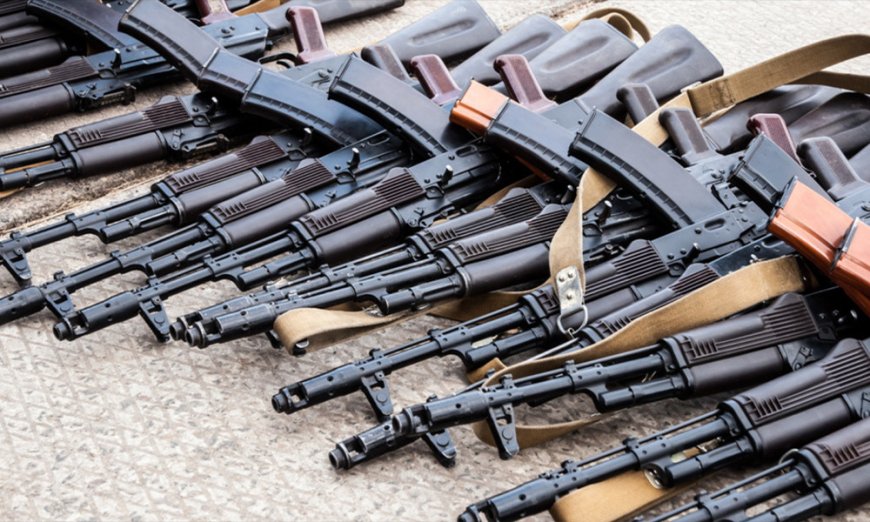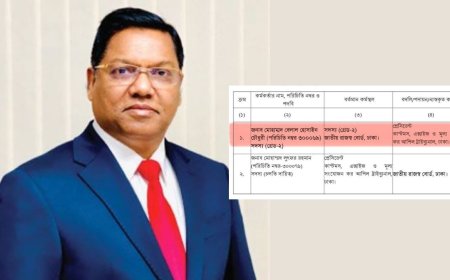Illegal Arms Entering the Country Through Seven Routes
At least five smuggling networks are involved in the arms trade, with Rohingyas from Cox’s Bazar participating in each group.

Illegal arms are reportedly entering Bangladesh through seven routes along the Bangladesh–Myanmar border, fueling growing concern among law enforcement agencies. At least five smuggling syndicates are active in this trade, with Rohingyas from Cox’s Bazar participating in each group. The primary destinations for these weapons are Rohingya camps in Cox’s Bazar and terrorist hideouts in the three hill districts.
Information gathered from border areas, Rohingya camps, and Border Guard Bangladesh (BGB) officials confirms that arms are being smuggled from Myanmar into Bangladesh. According to security sources, the recent surge in arms trafficking is unprecedented — weapons are now entering the country alongside drugs, with human trafficking groups also becoming involved.
Cox’s Bazar Superintendent of Police Md. Saifuddin Shaheen said that in the early hours of October 5, police from Ukhiya Police Station raided Moragachhtala in Palongkhali Union near the Ukhiya border, arresting five drug traffickers with two firearms, five cartridges, and 2,000 yaba tablets. The seized items had been brought from across the Myanmar border. He added that the proximity of the Rohingya camps to the border has made it easier for trafficking networks to smuggle weapons into Bangladesh.
Colonel Mohiuddin Ahmed, Commander of the BGB Ramu Sector, said smugglers transport weapons from Myanmar directly to Rohingya camps. To curb the inflow, BGB has intensified surveillance along the border. Over the past three months, more than 22 consignments of locally and foreign-made arms have been seized — a situation officials describe as deeply alarming.
Sources indicate that traffickers are using seven key routes along the 271-kilometer Bangladesh–Myanmar border. Major smuggling points include Baishfari in Ghumdhum Union under Naikhyangchhari upazila, Balukhali Customs Ghat at Ghumdhum Point, Palongkhali of Ukhiya, and Nolbonia of Whykong Union.
The Baishfari route, in particular, is remote, hilly, and densely forested. Members of the Chakma and Tanchangya ethnic communities in the area are reportedly involved in smuggling. Most of the weapons that enter through this route are destined for militant groups operating in the hill tracts of Khagrachhari, Rangamati, and Bandarban. Arms smuggled through other routes are mainly delivered to Rohingya camps.
Weapons are also being brought in via the Naf River, through Unchiprang and Ulubunia in Whykong Union, as well as Leda–Damdamia–Jadimura–Nayapara in Hnila Union of Teknaf, and Boraitli Canal of Teknaf Sadar Union. Rohingyas are primarily responsible for smuggling through these waterways, although reports suggest that a local resident named Kalu is collaborating with them at the Jadimura point.
Investigations reveal that five smuggling rings are actively moving arms from Myanmar into Bangladesh. Four of them are Rohingya armed groups — the Arakan Rohingya Salvation Army (ARSA), the Rohingya Solidarity Organization (RSO), the Halim Group led by Kefayet Ullah alias Abdul Halim, and the Nabi Hossain Group. The fifth network is a large armed organization operating in the forests of the three hill districts, reportedly comprising more than a hundred members.
Ordinary Rohingyas say the newly active Halim Group is based in Camp-7 of Kutupalong, Ukhiya, where Halim has set up his base in the Noukar Math area. A video obtained by Kaler Kantho on February 6, 2024, shows Halim displaying weapons looted from the Dekhibonia outpost of Myanmar’s Border Guard Police (BGP) near the Bangladesh border in Rakhine. Using strategic routes, he reportedly brought a large cache of modern arms from Myanmar into Bangladesh.
Lt. Colonel Kamrul Hasan, Commander of the RAB-15 Battalion, said joint forces led by RAB have recovered a significant number of weapons from Rohingya camps. In the past 18 months, RAB-15 has confiscated 1,279 weapons — including 21 foreign-made ones — and arrested 163 armed individuals.
Source of illegal weapons in Myanmar: Following the 2017 mass exodus of Rohingyas from Myanmar’s Rakhine State (Arakan) into Bangladesh, the Arakan Army emerged as a major armed group. Since November 13, 2023, it has been engaged in fierce conflict with Myanmar forces to gain control of Rakhine. By December 2024, the Arakan Army had seized almost all of Rakhine State along the 271-kilometer border with Bangladesh, capturing several BGP and Myanmar Army camps — which later became a major source of smuggled weapons flowing into Bangladesh.
What's Your Reaction?





















































































